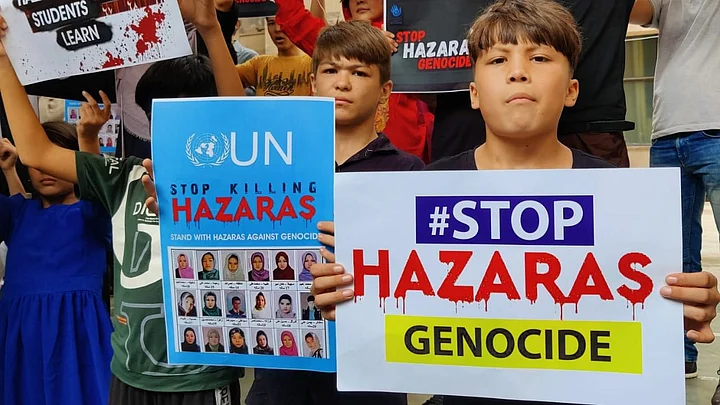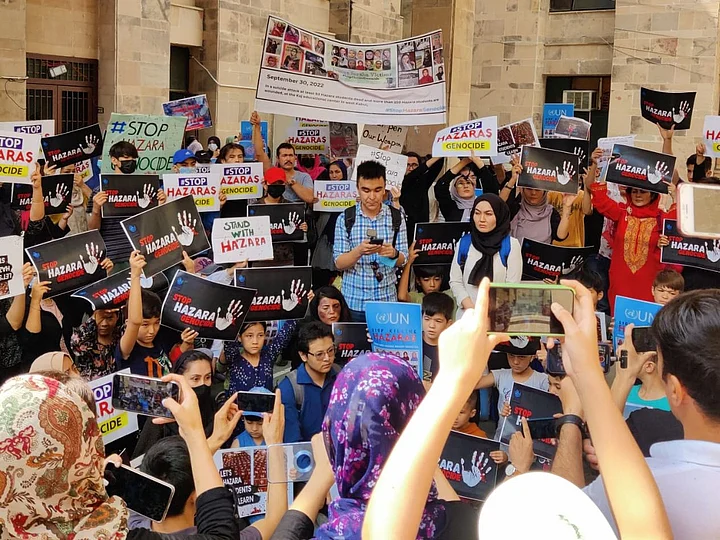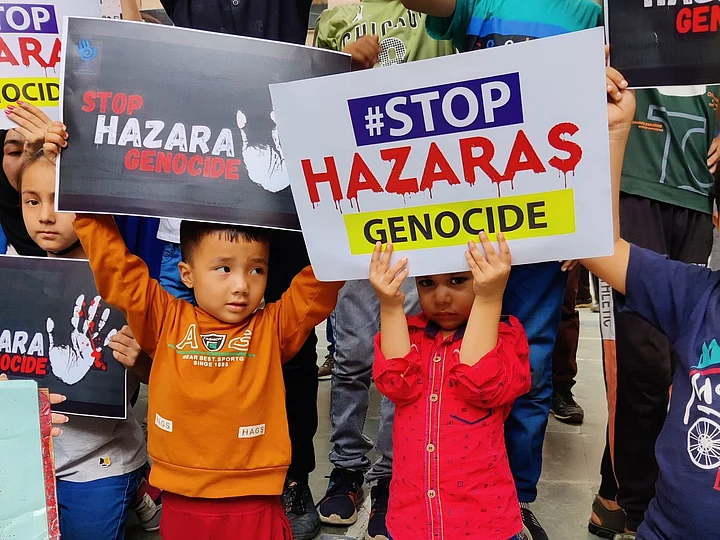A group of Afghan refugees, protesting against atrocities committed against the Hazara community in Afghanistan at Jantar Mantar, were detained by the Delhi Police on Thursday, 6 October.
The group was allegedly protesting despite the police's denial of permission due to security concerns.
About 150-200 Afghans were detained, of which around 95 were women, around 15 children, and around 140 men, Amin Yousufi, director of the Hazara Refugees Association in Delhi, told The Quint.
The protestors were detained for around seven hours before being released. While women and elderly protesters were released early, dozens of young male protesters remained at the Mandir Marg police station till about 8 pm.
- 01/02
(Photo: Accessed by The Quint)

- 02/02
(Photo: Accessed by The Quint)

"A week ago, we decided to organise a protest, a gathering, to remember the victims of the attack on the Kaaj education centre in Kabul a few days ago; and to condemn the ongoing genocide against the Hazaras in Afghanistan," explained Reza Ehsan, an Afghan Hazara asylum seeker and researcher based in Delhi, while speaking to The Quint.
Ehsan was referring to the 30 September suicide bomb attack that ripped apart an education centre in Afghanistan's capital Kabul.
The blast occurred at the Kaaj Education Centre in the capital's Dasht-e-Barchi neighbourhood, which is a predominantly Shiite Muslim area and home to the minority Hazara community. While the death toll is still not clear, local media estimated that more than 100 children died in the blast.
Although no terror group has claimed responsibility for the attack, reports assumed that the Islamic State – Khorasan Province (ISKP) is responsible, given that the outfit has claimed responsibility for over a dozen attacks on Hazaras in the past.
The Afghan refugees in Delhi were protesting this very targeting of Hazaras when they were detained by the police.
The objective of the campaign was to create awareness about what Ehsan calls an "ongoing genocide" against the Hazara community in Afghanistan.
'Police Withdrew Permission'
"The police initially gave us permission to hold the gathering," Ehsan said, claiming that authorities told the organisers that the protest can be held on 6 October, since both 4 and 5 October were already booked.
"Yesterday, however, on 6 October, the police cancelled the protest, last minute, citing security concerns. We went to Mandir Marg police station to get a new permit, which is when the Afghan refugees showed up in large numbers holding posters, demanding an end to the Hazara genocide."Reza Ehsan
"The police were not violent though," Ehsan clarified. "They even said that if you want to protest in the future, then you can."
"The movement for Hazaras is an international one. There are protests all across the globe. And a couple of us even met last night to discuss future protests. This is about justice for our people."
The Demands of the Protesters
Some of the demands of the protesting Afghans, as articulated in a statement issued by "the Afghanistan community in India", are:
That the United Nations establish an International Commission of Inquiry to investigate this and other attacks on Hazaras and other minorities in Afghanistan
That the UN Security Council convenes a special session to discuss these heinous crimes and take appropriate decisions to prevent similar tragedies from happening in the future and protect Hazaras.
That the UN and the international community take The Responsibility to Protect (R2O) measures to ensure the protection of Hazaras from the ongoing genocide
That international community and the Government of India to provide immediate support to the families and survivors of these attacks and vulnerable Hazaras in India.
Presently in Afghanistan, the Hazaras mostly reside in a part of the central highlands called Hazarajat, but they are scattered in other provinces and cities as well such as Kabul, Balkh, and Herat.
The refugees that are in Delhi barely have any employment opportunities but those who do have jobs, are engaged in labor work and small businesses, while a handful of them have white collar jobs in the private sector, remarked Ehsan.
Who are the Hazaras?
The Hazaras, according to Mehdi Hakimi, a fellow at Harvard Law School, were once the largest ethnic group in the country, constituting more than 60 percent of the overall Afghan population before the 19th century.
Under the brutal regime of Abdur Rahman Khan, the Pashtun ruler who reigned from 1880-1901, close to 60 percent of Hazaras were massacred, enslaved, or forced to flee from to countries like Pakistan and Iran.
Their lands were confiscated and many of them were forced to convert to Sunni Islam.
After the Soviet Union's military exited from Afghanistan in 1989, ending years of fighting against the US-backed Mujahideen forces, the Hazaras witnessed some of the worst atrocities under the first Taliban regime. One of the worst of these was the massacre in Mazar-I Sharif, a city in northern Afghanistan where thousands of Hazara men and boys were executed.
The most dangerous threat to the Hazaras at the moment is the IS-KP, which has been behind multiple attacks on Hazara mosques, schools, and workplaces across Afghanistan, according to Human Rights Watch.
Hazaras are primarily targeted because of their Shia identity. After all, the Taliban and the IS–KP are both Sunni extremist organizations, who believe that Shias are infidels.
Although the present Taliban regime has claimed that it is doing everything it possibly can to protect the Hazaras, the latest attack in Kabul presents a different picture, and an extremely dark reality.
(At The Quint, we question everything. Play an active role in shaping our journalism by becoming a member today.)


